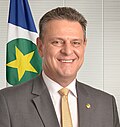| Party | Candidate | Most relevant political office or occupation | Party | Candidates for Alternate Senators | Coalition | Electoral number |
|---|
|  Workers' Party (PT) | 
Valdir Barranco | Member of the Legislative Assembly of Mato Grosso
(since 2016) | |  Communist Party of Brazil (PCdoB) | 1st alternate senator:
Maria Lúcia Neder | Defense of Life, Education, Land, Labour and Citizenship | 131 |
|  Workers' Party (PT) | 2nd alternate senator:
Enelinda Scalla |
|  Podemos (PODE) | 
José Medeiros | Member of the Chamber of Deputies for Mato Grosso
(since 2019) | |  Podemos (PODE) | 1st alternate senator:
Alexandre Agustin | — | 191 |
2nd alternate senator:
Zósima dos Santos |
|  Social Christian Party (PSC) | Reinaldo Morais | Entrepreneur and author | |  Social Christian Party (PSC) | 1st alternate senator:
Gilberto Cattani | Change Mato Grosso | 200 |
2nd alternate senator:
Neles Farias |
|  Christian Democracy (DC) | Elizeu Nascimento | Member of the Legislative Assembly of Mato Grosso
(since 2019) | |  Social Liberal Party (PSL) | 1st alternate senator:
Naime Moraes | Now It's the People's Turn | 270 |
2nd alternate senator:
Marcio Paulo da Silva |
|  New Party (NOVO) | Feliciano Azuaga | Economist and university professor | |  New Party (NOVO) | 1st alternate senator:
Antônio Carlos Rezende | — | 300 |
2nd alternate senator:
Vanessa Tomizawa |
| Brazilian Social Democracy Party (PSDB) | 
Nilson Leitão | Member of the Chamber of Deputies for Mato Grosso
(2011–2019) | |  Democrats (DEM) | 1st alternate senator:
Júlio Campos | Mato Grosso as Whole | 456 |
|  Liberal Party (PL) | 2nd alternate senator:
José Márcio Guedes |
|  Socialism and Liberty Party (PSOL) | Mauro César de Barros | State prosecutor | |  Socialism and Liberty Party (PSOL) | 1st alternate senator:
Gonçalina de Melo | — | 500 |
2nd alternate senator:
Wanderley da Guia |
|  Patriota | 
Coronel Fernanda | Colonel of the Mato Grosso Military Police | |  Patriota | 1st alternate senator:
Victório Galli | My Party is Brazil. Our Mission is Mato Grosso | 511 |
2nd alternate senator:
Luciano Esteves |
|  Social Democratic Party (PSD) | 
Carlos Fávaro | Senator for Mato Grosso
(since 2019) | |  Progressistas (PP) | 1st alternate senator:
Margareth Busetti | Do More for Mato Grosso | 555 |
| [[File:Brazilian_Democratic_Movement_logo.svg|class=skin-invert|100x100px|Brazilian Democratic Movement]] Brazilian Democratic Movement (MDB) | 2nd alternate senator:
José Lacerda |
|  Avante | Euclides Ribeiro | Entrepreneur and lawyer | | Brazilian Socialist Party (PSB) | 1st alternate senator:
Francileide Fontinelle | Forward Mato Grosso | 700 |
|  Democratic Labour Party (PDT) | 2nd alternate senator:
Ernando Cardoso |
|  Solidariedade | 
Pedro Taques | Governor of Mato Grosso
(2015–2019) | | [[File:Logomarca_Partido_Cidadania.png|class=skin-invert|100x100px|Cidadania]] Cidadania | 1st alternate senator:
Fausto Freitas | We're All Mato Grosso | 777 |
2nd alternate senator:
Elza Queiroz |
















